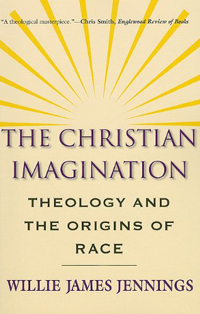 Willie James Jennings, The Christian Imagination: Theology and the Origins of Race (New Haven, Yale University Press, 2010), 366pp.
Willie James Jennings, The Christian Imagination: Theology and the Origins of Race (New Haven, Yale University Press, 2010), 366pp.
Why has Christianity, a religion presumably rooted in love, so often failed to heal social divisions? Why have followers of the One who came to liberate the captives and preach good news to the oppressed, so frequently become oppressors themselves?
In this wide-ranging historical and theological study, Willie James Jennings, Associate Professor of Theology and Black Church Studies at Duke University, attempts to answer these hard questions. He begins by sharing a formative experience from his own Midwestern childhood. His parents, migrants from the Deep South, were devout believers; Jesus, God, and Scripture were ever-present realities. Jennings remembers that one day, some white missionaries from a nearby church invited themselves into his mother's garden and proceeded to evangelize her. Not only were the missionaries unaware that Jennings' parents were pillars of their local church and long-time residents of the neighborhood; they seemed incapable of even imagining such a possibility. In that garden meeting, what came together were two Christianities, one black and one white. "Why did these men not know me," Jennings asks. Why did they "not know the multitude of other black Christians who filled the neighborhood that surrounded that church?"
Jennings' answer is that Western Christianity has long suffered from a "diseased social imagination." Drawing on diverse historical examples, ranging from the trans-Atlantic slave trade to Jewish-Christian relations to Native American history to faith-based literacy and Bible translation projects, Jennings demonstrates that it was church leaders, theologians, and other intellectual elites who first legitimized race-based colonization and subjugation — all in the name of bringing salvation to the nations. In particular, he suggests that the root error of these evangelistic endeavors was the forced dispossession and exile of non-European peoples from their homelands. In severing the deep connections between land and people, Jennings argues that God's good intentions for Creation were egregiously cast aside, and the doors for race-based hatred and violence were thrown wide open.
This is not an easy book. Neither in its writing — Jennings' prose is heavily academic and often bogged down in jargon — nor in its argument, which is quite challenging, and must unsettle us at a very deep level if we're honest and open. But the book does not end in despair; it calls Christians to move beyond racial and ethnic self-segregation, and follow Jesus' radical example of desiring, loving, and enfolding those from whom we differ. This provocative call alone makes the book a worthwhile read.


